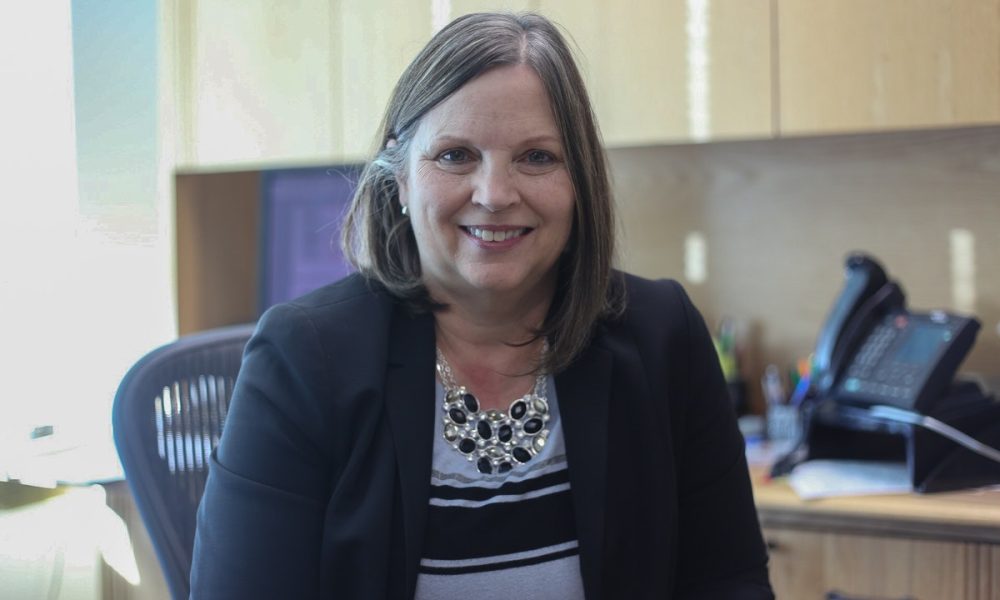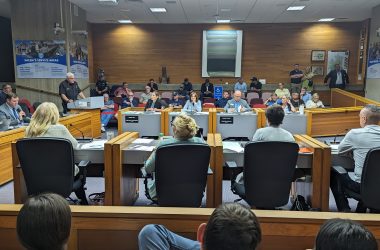
Outgoing county commissioner Janet Carlson has spent 16 years in office focused on helping people get a second change after coming out of jail. (Troy Brynelson/Salem Reporter)
Janet Carlson’s office is lined with a stack of plastic tubs, carefully labeled by topic.
The outgoing Marion County commissioner describes it as her “resident archives,” the record of dozens of projects and plans she’s been involved in during her 16 years at the county.
When she was elected in 2002, Carlson said she often irritated staff by constantly asking whether work had gotten done and pushing to move things quickly.
“I’ve had to learn to be a lot more patient than I was,” she said with a laugh.
Carlson won her last election in 2014 with 60 percent of the vote and could have run for another term. But retiring in 2019 has been her plan for a decade, ever since her grandson Brock was born.
She was in Boise with her daughter for his early afternoon birth. By evening, Brock’s chest was caving in.
“I got a call the next morning that they’d moved him to the neonatal intensive care unit,” she said.
A doctor told the family he had Down’s syndrome, a developmental disability.
“He says, ‘Well, will he graduate from high school? No. Will he go to college? No. Will he go on a mission for your church? No. Will he be a loving member of your family? Yes.’” Carlson said.
The doctor’s remarks infuriated Carlson.
“I just looked at my daughter and said, ‘Don’t you ever let anyone tell you the potential of your child,’” she said.
She vowed to be a regular part of her grandson’s life, and for the past decade, she’s seen him at least every six weeks, traveling to Boise or bringing her daughter’s family to Salem.
Next April, she’ll move to Boise to be more active in his life.
Carlson, a Republican, served one term in the Oregon legislature before running for commissioner. She has spent much of her time at the county focused helping people just released from prison and jail. She was the force behind the Marion County Re-entry Initiative, which helps ex-prisoners return to society through help with transportation, housing, jobs and health.
Carlson said the county has started several promising programs to cut down on homelessness. Earlier this year, Salem and Marion County worked together on a system to provide social services rather than an arrest for people engaging in minor crimes like trespassing or drug possession.
She said there is no single solution to the challenge of homelessness. Homeless people include veterans, seniors, teenagers, domestic violence victims and people who struggle with chronic mental illnesses and drug addictions. Each group requires different services.
“It’s just a very complicated issue to solve,” Carlson said.
There’s a pervasive belief that some people choose to be homeless, she said, which she’s found is usually inaccurate. Many homeless people will say they don’t want to change their lives on surveys, but when they sit down and talk to service providers, they offer more complicated responses.
“I think there’s a lot of that going on,” she said.
The county has joined with Salem to create a center where people under the influence of drugs of alcohol can get sober and connect to addiction treatment. That’s scheduled to open in the spring and is something she’ll be watching closely.
When Carlson was elected commissioner, there were few women in county government. She said it’s encouraging to see more women running for office across the country.
“I don’t make the case that you should vote for someone just because they’re a woman,” she said. But women often bring perspectives from having different life experiences, she said.
In January 2004, the county had a major snowstorm, with police advising everyone to stay off the roads. Carlson, in office just two years, had to decide whether the county should close its offices for the day.
She thought immediately of low-ranking county employees, especially single mothers who might feel compelled to drive into work despite dangerous roads because they couldn’t afford to miss a day of pay.
“It could be the difference between being able to pay your rent that month,” she said.
She pushed her fellow commissioners, all men, and department heads, to consider those people. That was a perspective they hadn’t considered, she said. Ultimately, the county closed for the day.
The growing polarization in national, and sometimes state politics, concerns her. She’s enjoyed her career in part because county government is a place where political party matters less.
Aside from land use issues, “there’s very little that’s partisan in county government,” she said.
Polarization is a result in part of people who felt unrepresented in politics now voicing their concerns, she said.
“I do think there are groups of people that feel like their interests have been ignored,” she said. She has seen people increasingly demonize those they disagree with.
She sees that happening around gun rights.
Those who support gun control are “seeing shootings and they’re thinking this is a thoughtful way to address a problem,” she said. And Second Amendment advocates “see it as a constitutional right and a threat to the liberty of law-abiding citizens to say I can’t have guns.”
“I’m not sure that I would side with one side or the other in terms of what the answer is. But I think it’s important to, in that polarization, to try to understand where people are coming from,” she said. “Just because one group believes in restricting guns, they’re not evil and if another group believes in protecting their constitutional rights, they’re not evil either.”
She has barely begun to pack up her office and said she hasn’t thought much about the fact she’s moving in a few months. Worrying about the future makes it too hard for her to get work done.
“I know I will miss things. I’m just not thinking about it right now,” she said.
Her daughter runs several nonprofit choirs in Boise which she hopes to help with and she may do some consulting work otherwise.
“I’m not going to be sitting around,” she said.
Reporter Rachel Alexander: (503) 575-1241 or [email protected].

Rachel Alexander is Salem Reporter’s managing editor. She joined Salem Reporter when it was founded in 2018 and covers city news, education, nonprofits and a little bit of everything else. She’s been a journalist in Oregon and Washington for a decade. Outside of work, she’s a skater and board member with Salem’s Cherry City Roller Derby and can often be found with her nose buried in a book.









